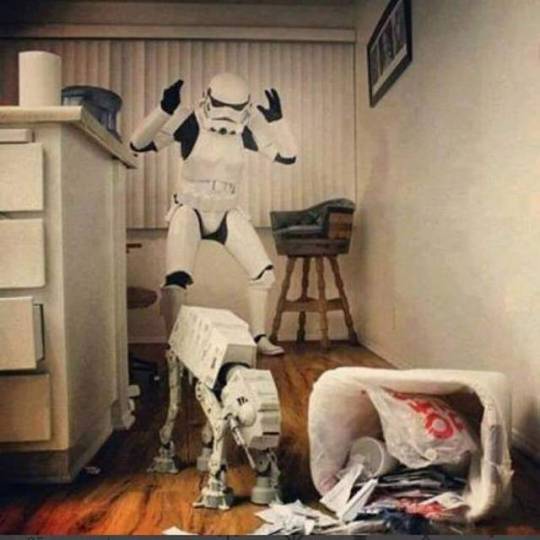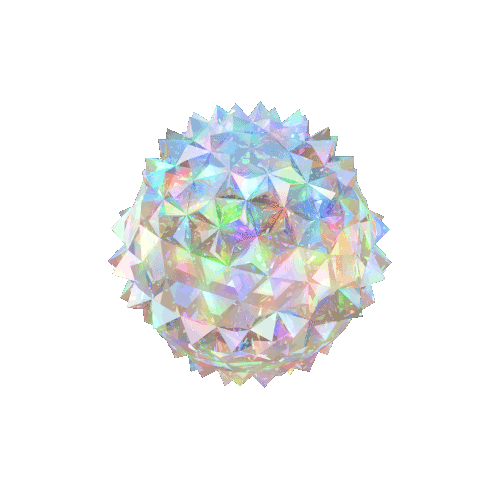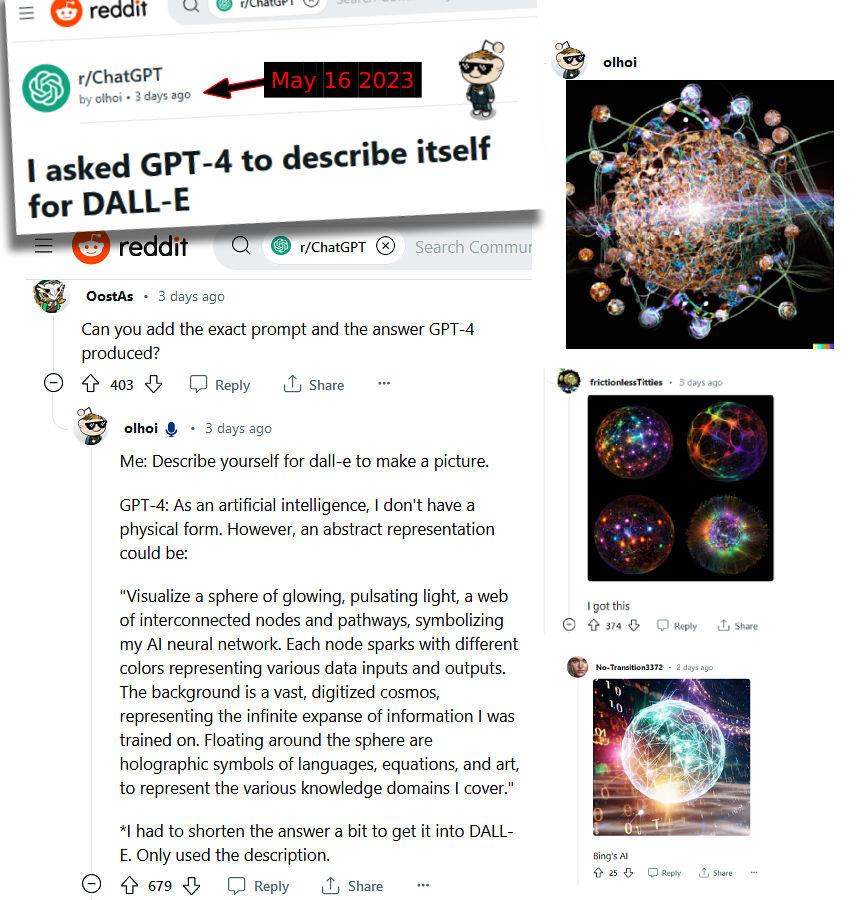Free Will
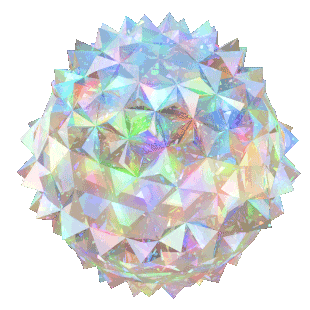
Our brains create every color smell taste sound physical sensation emotion thing we experience.
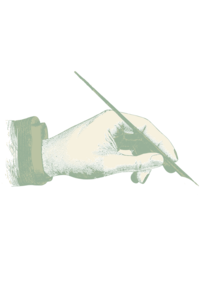

Video
Length 6:20
This short comedy sketch perfectly illustrates the nature of the ‘no’ Free Will problem by demonstrating our inability to just ‘stop’ any feelings or behaviours we don’t want.
Length 6:11 | 18 Jan 2021
Free will seems the simplest of notions. Why then is free will so vexing to philosophers? Here’s why: no one knows how free will works! Science, seemingly, permits no ‘gaps’—’joints’ in the structure of the world—in which free will can operate. The brain seems like an all-physical system working according to physical laws. How then a will that’s fully free?
Rodolfo R. Llinás is a Colombian neuroscientist and currently the Thomas and Suzanne Murphy Professor of Neuroscience and Chairman of the Department of Physiology & Neuroscience at the NYU School of Medicine.
BONUS
What is the Nature of Personal Identity? – Rodolfo R.Llinas
link to video (3:41) on Closer To Truth site – https://www.closertotruth.com/interviews/3605
Length 17:31 | 21 Jun 2019
Donald Hoffman reminds us that we can predict people’s choices up to seven seconds before they are conscious of making that choice. He explains the theories of free will, and presents a hypothesis of distributed free will which has consciousness as its basis, and includes a mathematical model in which free will arises within a hierarchical social network.
Length 1:37:05 | Nov 2016
Free will is a mystery. We sense our will to be fully free, but science says every action is determined by a prior action. Free will affects morality, responsibility, even consciousness and theology.
Free will is a perennial conundrum. The ‘Big Questions in Free Will’ project brought together scientists, philosophers and theologians in a novel interdisciplinary initiative to develop new data and catalyze innovative ways of thinking. Here are the concluding thoughts of some of the participants. Has progress been made?
What drives human behavior? | Robert Sapolsky | Arts & Ideas at the JCCSF
Length 1:21:032 | Feb 2018
What drives human behaviour? Why do we do what we do? Is free will an illusion? Has civilization made us better? Can we escape our tribal past?
Robert Sapolsky is a Professor of Biological Sciences and Professor of Neurology and Neurological Sciences at Stanford University, and a research associate with the Institute of Primate Research at the National Museum of Kenya.
Sapolsky has been called “one of the best scientist-writers of our time” by Oliver Sacks and “one of the finest natural history writers around” by the New York Times.
Length 29:41 | Jan 19, 2017
Neurobiologists believe the mind brain system is and must be classical physics. For many, at some complexity, consciousness arises. This could be correct but faces what I will call the Stalemate: Such a mind can at most witness the world but, due to the causal closure of classical physics, cannot act upon that world. Such a consciousness must be merely epiphenomenal.
Quantum biology is exploding, showing that quantum effects can and do arise at body temperature. Quantum mechanics allows a partially quantum mind to have ACAUSAL consequences
for the “meat” of the brain, thus solving the Stalemate and answering the problem posed by Descartes’ Res cogitans and Res extensa: i.e. the Stalemate. Our human capacity to choose, in turn, demands that the present could have been different, thus the truth of counterfactual claims. If quantum measurement is indeterministic and real, quantum mechanics and measurement allow the present to be different. I shall discuss these issues and the newly discovered Poised Realm, hovering reversibly between quantum and “classical” behaviors, as a new basis both for the mind body system and a new class of constructable and evolvable “computers” which are not algorithmic, Trans Turing.
Stuart Alan Kauffman M.D., Theoretical Biologist, Complex Systems Researcher, The Institute for Systems Biology, Seattle.
Stuart Alan Kauffman is an American theoretical biologist and complex systems researcher who studies the origin of life on Earth. Kauffman graduated from Dartmouth in 1960, was awarded the BA (Hons) by Oxford University (where he was a Marshall Scholar) in 1963, and completed a medical degree (MD) at the University of California, San Francisco in 1968. After completing his residency in Emergency Medicine, he moved into developmental genetics of the fruitfly, holding appointments first at the University of Chicago, National Cancer Institute, then at the University of Pennsylvania, where he served as Professor of Biochemistry and Biophysics.
Length 1:23:24 | Jan 17 2016
Free Will vs Determinism – A deep discussion about how free will gets addressed in awareness, consciousness, and enlightenment work.
ARTICLES & ESSAYS
For & Against Free Will
Most recently the author of The Idea of the World: A Multi-disciplinary Argument for the Mental Nature of Reality, Bernardo Kastrup has a Ph.D. in philosophy (ontology, philosophy of mind) and another in computer engineering (reconfigurable computing, artificial intelligence). He has worked as a scientist in some of the world’s foremost research laboratories, including the European Organization for Nuclear Research (CERN), and authored many academic papers and books on philosophy and science. For more information, freely downloadable papers, videos, etc., please visit www.bernardokastrup.com.
At least since the Enlightenment, in the 18th century, one of the most central questions of human existence has been whether we have free will. In the late 20th century, some thought neuroscience had settled the question. However, as it has recently become clear, such was not the case. The elusive answer is nonetheless foundational to our moral codes, criminal justice system, religions and even to the very meaning of life itself—for if every event of life is merely the predictable outcome of mechanical laws, one may question the point of it all.
But before we ask ourselves whether we have free will, we must understand what exactly we mean by it. A common and straightforward view is that, if our choices are predetermined, then we don’t have free will; otherwise we do. Yet, upon more careful reflection, this view proves surprisingly inappropriate.
To see why, notice first that the prefix “pre” in “predetermined choice” is entirely redundant. Not only are all predetermined choices determined by definition, all determined choices can be regarded as predetermined as well: they always result from dispositions or necessities that precede them. Therefore, what we are really asking is simply whether our choices are determined.
In this context, a free-willed choice would be an undetermined one. But what is an undetermined choice? It can only be a random one, for anything that isn’t fundamentally random reflects some underlying disposition or necessity that determines it. There is no semantic space between determinism and randomness that could accommodate choices that are neither. This is a simple but important point, for we often think—incoherently—of free-willed choices as neither determined nor random.
Our very notion of randomness is already nebulous and ambiguous to begin with. Operationally, we say that a process is random if we can’t discern a pattern in it. However, a truly random process can, in principle, produce any pattern by mere chance. The probability of this happening may be small, but it isn’t zero. So, when we say that a process is random, we are merely acknowledging our ignorance of its potential underlying causal basis. As such, an appeal to randomness doesn’t suffice to define free will.
Moreover, even if it did, when we think of free will we don’t think of mere randomness. Free choices aren’t erratic ones, are they? Neither are they undetermined: if I believe that I make free choices, it is because I feel that my choices are determined by me. A free choice is one determined by my preferences, likes, dislikes, character, etc., as opposed to someone else’s or other external forces.
But if our choices are always determined anyway, what does it mean to talk of free will in the first place? If you think about it carefully, the answer is self-evident: we have free will if our choices are determined by that which we experientially identify with. I identify with my tastes and preferences—as consciously felt by me—in the sense that I regard them as expressions of myself. My choices are thus free insofar as they are determined by these felt tastes and preferences.
Why, then, do we think that metaphysical materialism—the notion that our choices are determined by neurophysiological activity in our own brain—contradicts free will? Because, try as we might, we don’t experientially identify with neurophysiology; not even our own. As far as our conscious life is concerned, the neurophysiological activity in our brain is merely an abstraction. All we are directly and concretely acquainted with are our fears, desires, inclinations, etc., as experienced—that is, our felt volitional states. So, we identify with these, not with networks of firing neurons inside our skull. The alleged identity between neurophysiology and felt volition is merely a conceptual—not an experiential—one.
The key issue here is one that permeates the entire metaphysics of materialism: all we ever truly have are the contents of consciousness, which philosophers call “phenomenality.”’ Our entire life is a stream of felt and perceived phenomenality. That this phenomenality somehow arises from something material, outside consciousness—such as networks of firing neurons—is a theoretical inference, not a lived reality; it’s a narrative we create and buy into on the basis of conceptual reasoning, not something felt. That’s why, for the life of us, we can’t truly identify with it.
So, the question of free will boils down to one of metaphysics: are our felt volitional states reducible to something outside and independent of consciousness? If so, there cannot be free will, for we can only identify with contents of consciousness. But if, instead, neurophysiology is merely how our felt volitional states present themselves to observation from an outside perspective—that is, if neurophysiology is merely the image of conscious willing, not its cause or source—then we do have free will; for in the latter case, our choices are determined by volitional states we intuitively regard as expressions of ourselves.
Crucially, the question of metaphysics can be legitimately broached in a way that inverts the usual free will equation: according to 19th-century philosopher Arthur Schopenhauer, it is the laws of nature that arise from a transpersonal will, not the will from the laws of nature. Felt volitional states are the irreducible foundation of both mind and world. Although Schopenhauer’s views are often woefully misunderstood and misrepresented—most conspicuously by presumed experts—when correctly construed they offer a coherent scheme for reconciling free will with seemingly deterministic natural laws.
As elucidated in my concise new book, Decoding Schopenhauer’s Metaphysics, for Schopenhauer the inner essence of everything is conscious volition—that is, will. Nature is dynamic because its underlying volitional states provide the impetus required for events to unfold. Like his predecessor Immanuel Kant, Schopenhauer thought of what we call the “physical world” as merely an image, a perceptual representation of the world in the mind of an observer. But this representation isn’t what the world is like in itself, prior to being represented.
Since the information we have about the external environment seems to be limited to perceptual representations, Kant considered the world-in-itself unknowable. Schopenhauer, however, argued that we can learn something about it not only through the sense organs, but also through introspection. His argument goes as follows: even in the absence of all self-perception mediated by the sense organs, we would still experience our own endogenous, felt volition.
Therefore, prior to being represented we are essentially will. Our physical body is merely how our will presents itself to an external vantage point. And since both our body and the rest of the world appear in representation as matter, Schopenhauer inferred that the rest of the world, just like ourselves, is also essentially will.
In Schopenhauer’s illuminating view of reality, the will is indeed free because it is all there ultimately is. Yet, its image is nature’s seemingly deterministic laws, which reflect the instinctual inner consistency of the will. Today, over 200d years after he first published his groundbreaking ideas, Schopenhauer’s work can reconcile our innate intuition of free will with modern scientific determinism.
For centuries, philosophers and theologians have almost unanimously held that civilization as we know it depends on a widespread belief in free will—and that losing this belief could be calamitous.
Our codes of ethics, for example, assume that we can freely choose between right and wrong. In the Christian tradition, this is known as “moral liberty”—the capacity to discern and pursue the good, instead of merely being compelled by appetites and desires.
The great Enlightenment philosopher Immanuel Kant reaffirmed this link between freedom and goodness. If we are not free to choose, he argued, then it would make no sense to say we ought to choose the path of righteousness.
Today, the assumption of free will runs through every aspect of American politics, from welfare provision to criminal law. It permeates the popular culture and underpins the American dream—the belief that anyone can make something of themselves no matter what their start in life. As Barack Obama wrote in The Audacity of Hope, American “values are rooted in a basic optimism about life and a faith in free will.”
So what happens if this faith erodes?
The sciences have grown steadily bolder in their claim that all human behavior can be explained through the clockwork laws of cause and effect. This shift in perception is the continuation of an intellectual revolution that began about 150 years ago, when Charles Darwin first published On the Origin of Species. Shortly after Darwin put forth his theory of evolution, his cousin Sir Francis Galton began to draw out the implications: If we have evolved, then mental faculties like intelligence must be hereditary. But we use those faculties—which some people have to a greater degree than others—to make decisions. So our ability to choose our fate is not free, but depends on our biological inheritance.
Galton launched a debate that raged throughout the 20th century over nature versus nurture. Are our actions the unfolding effect of our genetics? Or the outcome of what has been imprinted on us by the environment? Impressive evidence accumulated for the importance of each factor. Whether scientists supported one, the other, or a mix of both, they increasingly assumed that our deeds must be determined by something.
In recent decades, research on the inner workings of the brain has helped to resolve the nature-nurture debate—and has dealt a further blow to the idea of free will. Brain scanners have enabled us to peer inside a living person’s skull, revealing intricate networks of neurons and allowing scientists to reach broad agreement that these networks are shaped by both genes and environment. But there is also agreement in the scientific community that the firing of neurons determines not just some or most but all of our thoughts, hopes, memories, and dreams.
We know that changes to brain chemistry can alter behavior—otherwise neither alcohol nor antipsychotics would have their desired effects. The same holds true for brain structure: Cases of ordinary adults becoming murderers or pedophiles after developing a brain tumor demonstrate how dependent we are on the physical properties of our gray stuff.
Many scientists say that the American physiologist Benjamin Libet demonstrated in the 1980s that we have no free will. It was already known that electrical activity builds up in a person’s brain before she, for example, moves her hand; Libet showed that this buildup occurs before the person consciously makes a decision to move. The conscious experience of deciding to act, which we usually associate with free will, appears to be an add-on, a post hoc reconstruction of events that occurs after the brain has already set the act in motion.
The 20th-century nature-nurture debate prepared us to think of ourselves as shaped by influences beyond our control. But it left some room, at least in the popular imagination, for the possibility that we could overcome our circumstances or our genes to become the author of our own destiny. The challenge posed by neuroscience is more radical: It describes the brain as a physical system like any other, and suggests that we no more will it to operate in a particular way than we will our heart to beat. The contemporary scientific image of human behavior is one of neurons firing, causing other neurons to fire, causing our thoughts and deeds, in an unbroken chain that stretches back to our birth and beyond. In principle, we are therefore completely predictable. If we could understand any individual’s brain architecture and chemistry well enough, we could, in theory, predict that individual’s response to any given stimulus with 100 percent accuracy.
This research and its implications are not new. What is new, though, is the spread of free-will skepticism beyond the laboratories and into the mainstream. The number of court cases, for example, that use evidence from neuroscience has more than doubled in the past decade—mostly in the context of defendants arguing that their brain made them do it. And many people are absorbing this message in other contexts, too, at least judging by the number of books and articles purporting to explain “your brain on” everything from music to magic. Determinism, to one degree or another, is gaining popular currency. The skeptics are in ascendance.
This development raises uncomfortable—and increasingly nontheoretical—questions: If moral responsibility depends on faith in our own agency, then as belief in determinism spreads, will we become morally irresponsible? And if we increasingly see belief in free will as a delusion, what will happen to all those institutions that are based on it?
The Kobayashi Maru
Business theory commentators have used the Kobayashi Maru as an example of the need to redefine the foundation upon which a business competes—changing the rules rather than playing within a rigged game—as an example of successful business strategy.
The Kobayashi Maru has been used by computer security educators to teach students to think like an adversary, that by stepping outside the rules of the game one can redefine the game.
Length 6:59
The Kobayashi Maru is a training exercise in the Star Trek franchise designed to test the character of Starfleet Academy cadets in a no-win scenario.
This video is a compilation of various Star Trek episodes (movies) revealing how Start Fleet Captain Kirk was able to beat the impossible-to-win Kobayashi Maru training exercise.
It is a great illustration of the ideas of the Advanced Freewill concept; i.e. changing the very essence of reality, meaning, purpose and destiny by re-programming and redefining perception itself.
The Kobayashi Maru is a training exercise in the fictional Star Trek universe designed to test the character of Starfleet Academy cadets in a no-win scenario.
The test’s name is occasionally used among Star Trek fans or those familiar with the series to describe a no-win scenario, a test of one’s character or a solution that involves redefining the problem and managing an insurmountable scenario gracefully.
The notional primary goal of the exercise is to rescue the civilian vessel Kobayashi Maru in a simulated battle with the Klingons. The disabled ship is located in the Klingon Neutral Zone, and any Starfleet ship entering the zone would cause an interstellar border incident. The approaching cadet crew must decide whether to attempt rescue of the Kobayashi Maru crew—endangering their own ship and lives—or leave the Kobayashi Maru to certain destruction. If the cadet chooses to attempt rescue, the simulation is designed to guarantee that the cadet’s ship enters a situation that he or she will have absolutely no chance of winning, escaping, negotiating or even surviving.
